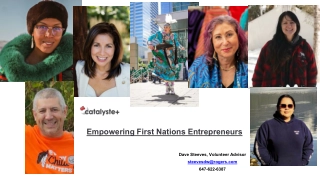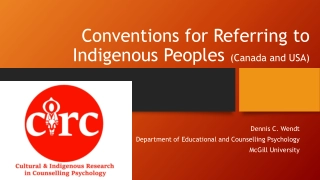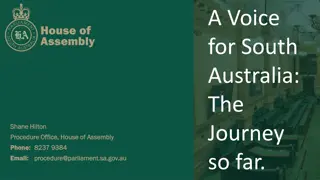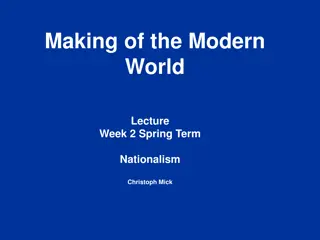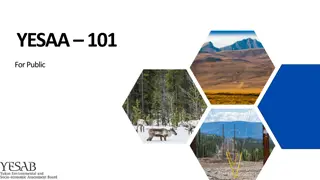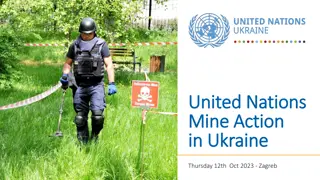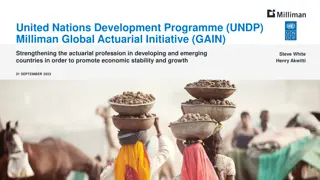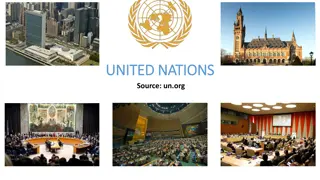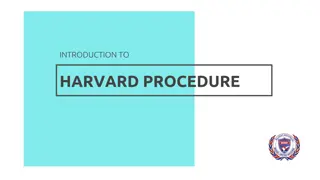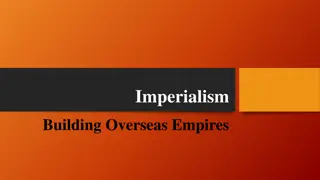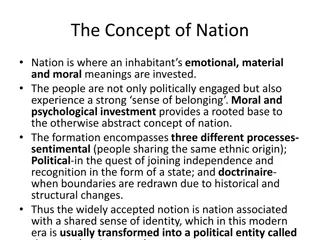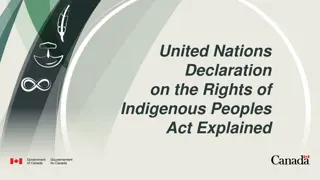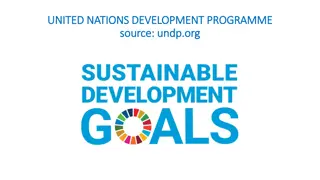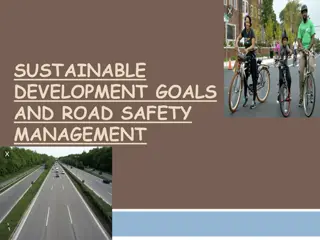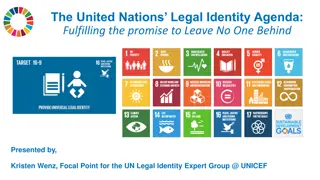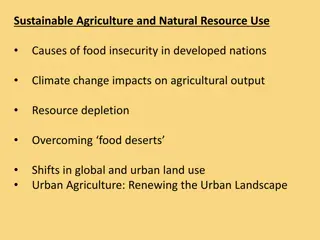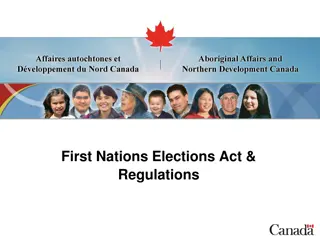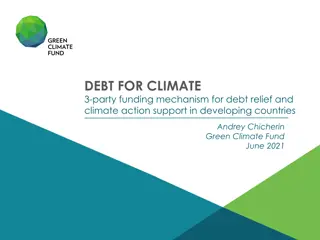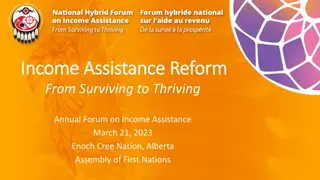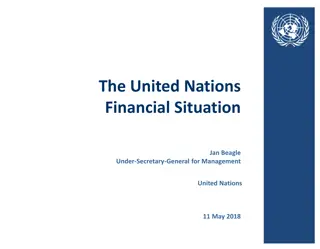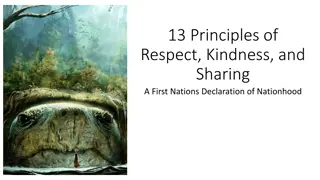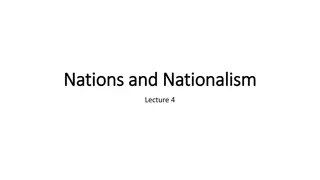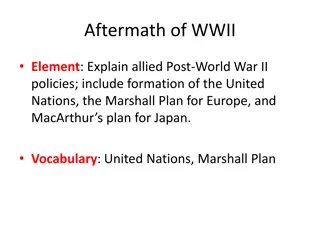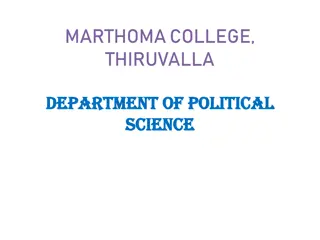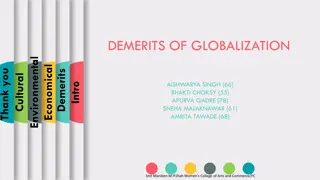Empowering First Nations Entrepreneurs
Empowering First Nations Entrepreneurs is a program by OFNEDA, a Canadian economic development organization, providing guidance and support to Indigenous entrepreneurs. The initiative matches Indigenous partners with experienced volunteer advisors to enhance capacity-building and facilitate communit
0 views • 28 slides
Conventions for Referring to Indigenous Peoples in Canada and the USA
This article outlines guidelines for referring to Indigenous Peoples, emphasizing specificity and respect for preferred names and terms. It discusses the importance of capitalizing terms related to Indigenous Nations and cautions against using terms implying colonial possession. The use of terms lik
1 views • 24 slides
Europe visit visa update Schengen Visa Appointments Unavailable Until September
Due to the high demand in this year\u2019s schedule, several popular destinations in Europe have no more available appointments until September this year. However, this doesn\u2019t mean that you should wait for those popular destinations as you can still apply and see if you get one for other Europ
1 views • 2 slides
Empowering Indigenous Voices in South Australia
Explore the journey of South Australia in recognizing and empowering Indigenous voices through various initiatives like the Aboriginal Representative Body Bill and the First Nations Voice Act. Witness the historical agreements and committees established to uphold the rights and representation of Fir
4 views • 13 slides
Regional Education Agreement Costing Tools Presentation
Presented by Bram Lerat, Khrystyna Orobets, and Ronda Ziakris for the Assembly of First Nations, this presentation discusses tools available for First Nations education costing studies, including inclusive education and transportation cost models. The session covers key elements of cost studies and
1 views • 26 slides
United Nations Development Programme - Financial Overview 2022
This document provides a detailed financial overview of the United Nations Development Programme's multi-country Western Pacific HIV, TB, and Malaria Program for the year 2022. It includes budget allocations, expenditures, grant information, sub-recipient performance, and reprogramming activities. T
0 views • 10 slides
Nationalism Through the Ages: Exploring the Evolution of Nations
Delve into the concept of nationalism with Christoph Mick in the "Making of the Modern World" lecture series. From defining nations to discussing the importance of national character and heritage, explore how nationalism has shaped societies throughout history.
5 views • 32 slides
Engaging Our World: 100+ Years of Global Ministry Impact
Our mission is to bring Christ to the nations and the nations to the Church. With a focus on reaching the unreached, our unique ministry model equips local staff and volunteers to effectively communicate the Gospel in their context. Through culturally relevant programming such as radio and TV broadc
6 views • 31 slides
Indigenous Services Canada: Emergency Management in First Nations Communities
Indigenous Services Canada plays a vital role in emergency management for First Nations communities through various programs and initiatives. These programs focus on strengthening resiliency, preparedness, response, and recovery in the face of hazards and emergencies. The department collaborates wit
2 views • 18 slides
Understanding the Purpose and Origin of YESAA Legislation
YESAA, the Yukon Environmental and Socio-economic Assessment Act, was developed in collaboration with Yukon First Nations to ensure environmentally and socially responsible project assessments. The Act, passed in 2003, aims to protect environmental quality, heritage resources, and the well-being of
3 views • 19 slides
Addressing Ukraine's Mine Action Challenges - United Nations Efforts
The United Nations is actively involved in mine action efforts in Ukraine, where a large portion of territory has been affected by war and potential landmine contamination. The need for outcome-driven demining, risk management, and innovative solutions are highlighted to effectively address the dual
6 views • 11 slides
Maximizing Credit Allocation through Cashless Policy in Developing Nations
The adoption of cashless policies can significantly impact credit allocation in developing nations by reducing risks, enhancing financial inclusion, combating crime, and speeding up transactions. This article explores the benefits and opportunities of leveraging cashless policies in the financial se
3 views • 18 slides
United Nations Survey on Crime Trends and Operations of Criminal Justice Systems
The United Nations Survey on Crime Trends and Operations of Criminal Justice Systems (UN-CTS) focuses on harmonizing data collection, identifying crime patterns, improving monitoring of the criminal justice system, and enhancing international comparability of crime statistics. It was mandated by the
3 views • 18 slides
Milliman Global Actuarial Initiative (GAIN)
The United Nations Development Programme (UNDP) and Milliman Global Actuarial Initiative (GAIN) are working together to enhance the actuarial profession in developing nations, fostering economic stability, and growth. The initiative aims to promote risk protection mechanisms through insurance contri
5 views • 27 slides
Ireland's Engagement with the League of Nations: Path to Independence
Ireland's entry into the League of Nations in 1923 marked a significant step towards independence after the War of Independence and Civil War. Through joining the League and asserting its independence, Ireland demonstrated its readiness to participate in global initiatives for peace and cooperation.
4 views • 17 slides
United Nations Legal Identity Agenda and Civil Registration Guidelines
The United Nations Legal Identity Agenda aims to ensure legal recognition for all individuals through civil registration systems. This initiative, aligned with the 2030 Agenda for Sustainable Development, emphasizes birth registration and legal identity as fundamental rights. The agenda encompasses
1 views • 10 slides
Overview of the United Nations: Mission, Membership, and Impact
The United Nations, established in 1945 with headquarters in New York City, is an international organization comprising 193 Member States. Guided by its founding Charter, the UN addresses various global challenges such as peace, climate change, human rights, and more. Through its bodies and committe
0 views • 21 slides
Harvard Procedure Guidelines and Rules for Model United Nations
In this guide, you will explore the rules and procedures specific to the Harvard Procedure in Model United Nations. It covers general rules, guidelines on resolutions and voting, language requirements, courtesy expectations, rules of procedure, motions, points of order, and parliamentary inquiries.
5 views • 20 slides
European Imperialism in the Late 19th Century
European nations in the late 1800s pursued imperialism to expand their empires for economic, political, and social reasons. Motives included economic interests, political and military ambitions, and the ideology of Social Darwinism. The Industrial Revolution fueled the need for resources and markets
1 views • 14 slides
Threats to National Sovereignty in a Globalised World
National sovereignty faces threats in a globalised world due to factors like nationalism, westernisation, foreign ownership of companies, and disunity within nations. Issues such as challenges to national identity, consequences of disunity, and inequality caused by globalisation impact the stability
0 views • 4 slides
Understanding the Concept of Nation and Ethnic Identity
The concept of nation is deeply rooted in emotional, material, and moral investments, leading to a strong sense of belonging. Various scholars present different perspectives on nationhood, from sentimental and political processes to the debate on whether a nation is a political or cultural entity. N
1 views • 15 slides
Understanding the United Nations Declaration on the Rights of Indigenous Peoples Act
The United Nations Declaration on the Rights of Indigenous Peoples Act, effective from June 21, 2021, aims to protect and promote Indigenous rights, including self-determination and equality. Key elements include the preamble emphasizing reconciliation, interpretive elements in Section 2, and the de
1 views • 13 slides
United Nations Sustainable Development Goals (SDGs) Overview
The United Nations Sustainable Development Goals (SDGs), also known as the Global Goals, aim to end poverty, hunger, and various inequalities by 2030. There are 17 interconnected SDGs covering key aspects like poverty eradication, gender equality, climate action, and sustainable development. These g
1 views • 24 slides
Understanding Sustainable Development Goals and Road Safety Management
The Sustainable Development Goals (SDGs) are set by the United Nations to address various global challenges such as poverty, hunger, education, and gender equality. This initiative aims to promote sustainable development in developing nations, with a focus on Africa. Road safety management is also c
1 views • 19 slides
Understanding the League of Nations: Good Idea or Not?
The League of Nations, established after WWI, aimed to promote peace through collective security and cooperation among nations. It faced challenges due to limited powers and the attitudes of key member countries. Despite its intentions, the League ultimately struggled to prevent future conflicts.
0 views • 9 slides
United Nations Legal Identity Agenda: Achieving SDG 16.9
The United Nations Legal Identity Expert Group (LIEG) aims to close the global legal identity gap by over 300 million within four years. The group focuses on implementing a life-cycle approach to legal identity, starting from birth, to ensure no one is left behind. The structure and strategy of LIEG
0 views • 10 slides
First Nations Attack on Fort Michilimackinac 1763: Causes, Tribes, and Aftermath
The First Nations' attack on Fort Michilimackinac in 1763 was triggered by British actions that disrupted their way of life. The Ojibwe, Odawa, Potawatomi, Ottawas, and Hurons were involved in the attack, led by Chief Pontiac. Following the attack, the British did not rebuild the fort but establishe
1 views • 7 slides
Comprehensive Care Model for Sickle Cell Disease Management
Comprehensive care is crucial for managing sickle cell disease, the most common haemoglobinopathy worldwide. Despite advancements in high-income countries, challenges persist in low and medium-income nations, leading to preventable deaths, especially in Africa. A comprehensive care approach has sign
0 views • 15 slides
Challenges in Sustainable Agriculture and Food Security in Developed Nations
The causes of food insecurity in developed nations include demographic shifts, population growth, and economic development leading to an increasing global demand for food. Changes in dietary preferences towards more resource-intensive food items like meat are impacting agricultural output and natura
1 views • 36 slides
Enhancing First Nations Governance through the First Nations Elections Act
The First Nations Elections Act (FNEA), developed between 2008 and 2011, addresses weaknesses in the Indian Act election system by offering an optional framework for First Nations governance. Key components include four-year terms, common election days, court appeals, defined offenses, and opting ou
0 views • 14 slides
Understanding Orange Shirt Day & First Nations Heritage
Lend your support to Orange Shirt Day as a tribute to First Nations children who suffered in residential schools. Learn about the resilient spirit of First Nations families and their rich cultural traditions.
0 views • 13 slides
Three-Party Funding Mechanism for Debt Relief and Climate Action Support in Developing Countries
Developing countries require significant financial support to address climate vulnerabilities, surpassing current commitments from developed nations. A suggested three-party funding mechanism aims to facilitate ongoing funding for climate projects while providing debt relief to vulnerable countries,
0 views • 11 slides
Reforming Income Assistance for First Nations: Building Towards Self-Determination
Income Assistance Reform for First Nations aims to address the longstanding gaps in the current program, focusing on enhancing self-determination and support for thriving communities. The initiative involves a co-development process led by First Nations to make the program more responsive to their u
0 views • 9 slides
United Nations Financial Situation Analysis
This analysis provides insights into the financial status of the United Nations as of various dates in 2016, 2017, and 2018. It includes data on assessments, payments, outstanding dues, cash on hand, and the number of member states paying in full. Charts visualize the regular budget assessment statu
0 views • 24 slides
Principles of Respect, Kindness, and Sharing: A First Nations Declaration
In this declaration, the author emphasizes the responsibility of First Nations as caretakers of their ancestral lands. It discusses the historical exclusion of First Peoples in the formation of Canada and calls for the recognition and preservation of Indigenous rights and sovereignty. The text highl
0 views • 16 slides
Understanding Nations, Nationalism, and Their Emergence: A Comprehensive Overview
Explore the concept of nationhood, the evolution of nationalism, and the intricate relationship between cultural and political identities. Delve into the emergence of nations, the definition of a nation, and the complexities of cultural nations. Uncover historical examples, such as the Polish-Lithua
0 views • 15 slides
Post-World War II Policies: United Nations, Marshall Plan, and MacArthur's Plan
Following the aftermath of World War II, allied nations implemented various policies such as the formation of the United Nations, the Marshall Plan for Europe, and MacArthur's plan for Japan. Post-war Europe faced severe devastation, leading to the need for international peacekeeping efforts and eco
0 views • 38 slides
The Divine Narrative: Nations, Jubilee, and History - Reflections on God’s Sovereignty
Explore the intertwining threads of biblical prophecies, the significance of Jubilee cycles in Israel, and historical milestones, all illustrating God's divine plan for nations. From the ancient testimonies of Israel to modern-day reflections of Jubilee observances, witness the grand tapestry of God
0 views • 15 slides
Collective Security in International Relations: A Comprehensive Overview
Collective security is a crucial concept in international politics, aimed at maintaining peace and preventing aggression among nations. This system calls for joint action to counter threats to global peace, originating post-World War I with the League of Nations. Based on four key principles, nation
0 views • 8 slides
The Demerits of Globalization: Environmental, Economic, and Cultural Impacts
Globalization has brought about negative impacts on the environment, economy, and culture. Issues such as the widening gap between rich and poor nations, loss of local industries' competitiveness, spread of diseases, and cultural erosion have been observed. The interconnected global economy faces ch
0 views • 7 slides
